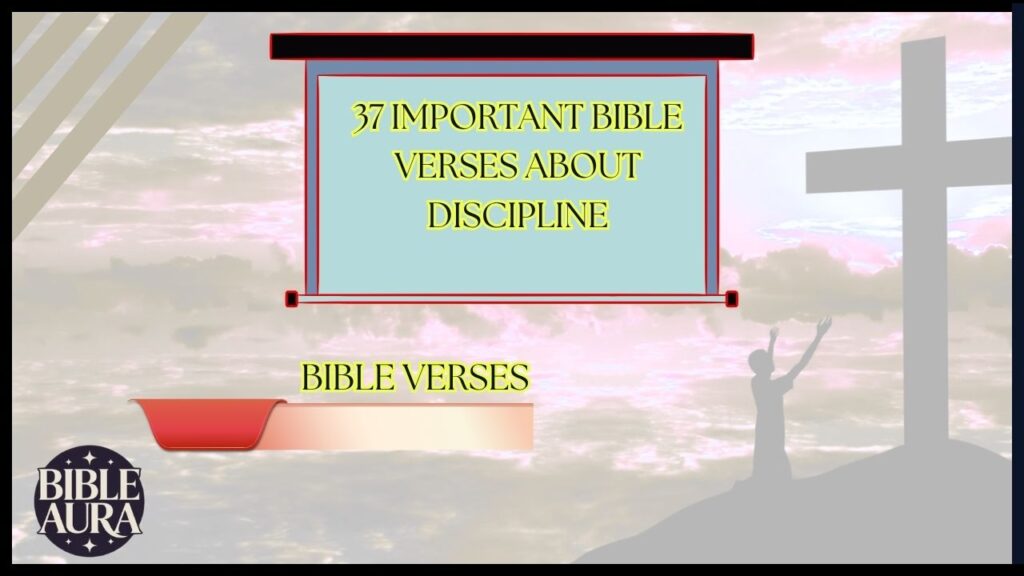Bible Verses About Discipline: Discipline is one of the most misunderstood concepts in the Christian walk. Many view it solely as punishment or correction, but biblical discipline is far richer it’s about shaping character, refining faith, and guiding believers toward spiritual maturity.
Scripture reveals that God’s discipline flows from His deep love for us. Just as a parent disciplines a child to protect them from harm and develop their character, our Heavenly Father’s discipline is always purposeful and redemptive.
The Bible contains profound wisdom about both God’s loving discipline toward us and how we should practice self-discipline and appropriate discipline with others. These verses serve as guideposts for navigating life’s challenges with wisdom and grace.
God’s Loving Discipline
1. Hebrews 12:5-6
“And have you forgotten the exhortation that addresses you as sons? ‘My son, do not regard lightly the discipline of the Lord, nor be weary when reproved by him. For the Lord disciplines the one he loves, and chastises every son whom he receives.'”
God’s discipline isn’t random punishment but an expression of His fatherly love. When we experience correction from God, it confirms our position as His beloved children. Rather than becoming discouraged by discipline, we should recognize it as evidence of God’s active care in our lives.
2. Hebrews 12:11
“For the moment all discipline seems painful rather than pleasant, but later it yields the peaceful fruit of righteousness to those who have been trained by it.”

Discipline is rarely enjoyable in the moment, but it produces tremendous spiritual growth. The temporary discomfort of correction leads to lasting righteousness and peace. Remember this verse when facing difficult seasons, knowing that God is developing beautiful fruit in your life through the process.
3. Revelation 3:19
“Those whom I love, I reprove and discipline, so be zealous and repent.”
Jesus directly connects His love with His discipline. His correction always aims to bring us back to Him through repentance. When you sense conviction from the Holy Spirit, respond with enthusiasm rather than resistance, knowing this discipline flows from Christ’s deep love for you.
4. Job 5:17-18
“Behold, blessed is the one whom God reproves; therefore despise not the discipline of the Almighty. For he wounds, but he binds up; he shatters, but his hands heal.”
Scripture remarkably calls those who receive God’s discipline “blessed.” His correction, though sometimes painful, always moves toward healing and restoration. When facing God’s discipline, remember that the same hands that wound will ultimately bind up and heal you completely.
5. Proverbs 3:11-12
“My son, do not despise the Lord’s discipline or be weary of his reproof, for the Lord reproves him whom he loves, as a father the son in whom he delights.”
God’s discipline isn’t punishment from an angry deity but correction from a delighted Father. When facing divine discipline, remember it flows from God’s deep delight in you as His child. This perspective transforms how we receive correction from the Lord.
Also Read: 47 Bible Verses About Being Set Apart (Explained)
Self-Discipline and Spiritual Growth
6. 1 Corinthians 9:27
“But I discipline my body and keep it under control, lest after preaching to others I myself should be disqualified.”
Paul emphasizes the importance of personal discipline, especially for spiritual leaders. Self-discipline prevents hypocrisy and maintains integrity in our witness. Create specific practices of self-discipline in areas where you struggle, knowing that consistency strengthens your testimony.
7. Proverbs 25:28
“A man without self-control is like a city broken into and left without walls.”
Self-discipline functions as protective boundaries in our lives. Without it, we become vulnerable to temptation and spiritual attack. Identify areas where you lack self-control and deliberately strengthen those “walls” through prayer, accountability, and consistent practice.
8. Galatians 5:22-23
“But the fruit of the Spirit is love, joy, peace, patience, kindness, goodness, faithfulness, gentleness, self-control; against such things there is no law.”
Self-discipline isn’t merely human willpower but a fruit of the Spirit’s work in us. When you struggle with self-control, rely on the Holy Spirit rather than your own strength. Ask Him daily to produce this fruit in your life as you surrender to His leading.
9. 1 Timothy 4:7-8
“Train yourself for godliness; for while bodily training is of some value, godliness is of value in every way, as it holds promise for the present life and also for the life to come.”
Spiritual discipline requires intentional training, just like physical fitness. Unlike physical exercise, spiritual discipline yields eternal benefits. Develop a “training program” for your spiritual life with specific practices that strengthen your godliness.
10. Titus 2:11-12
“For the grace of God has appeared, bringing salvation for all people, training us to renounce ungodliness and worldly passions, and to live self-controlled, upright, and godly lives in the present age.”

God’s grace doesn’t merely save us but actively trains us in godly living. Self-discipline flows from grace rather than earning grace. Let God’s unmerited favor motivate your self-discipline, knowing He’s already accepted you completely.
11. 2 Timothy 1:7
“For God gave us a spirit not of fear but of power and love and self-discipline.”
Self-discipline is a divine gift, not something we must manufacture through sheer willpower. When temptation arises, remember that God has already equipped you with the self-discipline you need. Draw upon this spiritual resource He’s placed within you.
12. Proverbs 16:32
“Whoever is slow to anger is better than the mighty, and he who rules his spirit than he who takes a city.”
Emotional self-discipline demonstrates greater strength than physical power. Controlling our reactions requires tremendous inner strength. Practice pausing before responding when emotions run high, and celebrate these “inner victories” as significant spiritual achievements.
Also Read: 45 Bible Verses About Gossip and Slander (Explained)
Parental Discipline and Child-Rearing
13. Proverbs 13:24
“Whoever spares the rod hates his son, but he who loves him is diligent to discipline him.”
Loving parents provide consistent, appropriate discipline. This verse isn’t advocating physical punishment but rather emphasizing the importance of not neglecting correction. Express your love for children by providing clear boundaries and consistent guidance rather than avoiding difficult conversations.
14. Ephesians 6:4
“Fathers, do not provoke your children to anger, but bring them up in the discipline and instruction of the Lord.”
Effective discipline balances correction with nurturing spiritual growth. Discipline should never be harsh or arbitrary but should point children toward the Lord. Before correcting children, check your motives and methods to ensure they reflect God’s character rather than your frustration.
15. Proverbs 22:6
“Train up a child in the way he should go; even when he is old he will not depart from it.”
Discipline is part of a larger process of training children according to their unique design. Effective discipline considers a child’s individual personality and needs. Observe each child’s temperament and adjust your disciplinary approach accordingly while maintaining consistent biblical principles.
16. Proverbs 29:15
“The rod and reproof give wisdom, but a child left to himself brings shame to his mother.”
Children need both correction and verbal instruction to develop wisdom. Neglecting discipline ultimately harms children rather than sparing them. Remember that appropriate discipline protects children from the greater pain of uncorrected character flaws later in life.
17. Proverbs 29:17
“Discipline your son, and he will give you rest; he will give delight to your heart.”
Proper discipline ultimately brings joy to both parent and child. The temporary discomfort of correction leads to long-term peace in the relationship. When discipline feels difficult, focus on the future harmony you’re building rather than the present conflict.
Also Read: 36 Important Bible Verses About Casting Out Demons
Discipline in the Church and Community
18. Matthew 18:15-17
“If your brother sins against you, go and tell him his fault, between you and him alone. If he listens to you, you have gained your brother. But if he does not listen, take one or two others along with you, that every charge may be established by the evidence of two or three witnesses. If he refuses to listen to them, tell it to the church. And if he refuses to listen even to the church, let him be to you as a Gentile and a tax collector.”
Jesus established a clear process for addressing sin within the community of believers. Church discipline should always begin privately and escalate only when necessary. Follow Christ’s pattern precisely, never skipping steps or making public what should be addressed privately first.
19. 1 Corinthians 5:5
“You are to deliver this man to Satan for the destruction of the flesh, so that his spirit may be saved in the day of the Lord.”

Church discipline, even when severe, always aims at restoration rather than punishment. The goal is never to cast someone out permanently but to bring them to repentance. When participating in church discipline, continually check your heart for redemptive motives rather than punitive ones.
20. Galatians 6:1
“Brothers, if anyone is caught in any transgression, you who are spiritual should restore him in a spirit of gentleness. Keep watch on yourself, lest you too be tempted.”
Effective discipline requires gentleness and humility, recognizing our own vulnerability. Those administering discipline must guard against pride or self-righteousness. Before addressing someone else’s sin, spend time in self-examination and prayer for a gentle spirit.
21. 2 Thessalonians 3:14-15
“If anyone does not obey what we say in this letter, take note of that person, and have nothing to do with him, that he may be ashamed. Do not regard him as an enemy, but warn him as a brother.”
Discipline within the church may require temporary distance but never permanent rejection. Even when separation is necessary, we continue to view the person as family. Maintain an attitude of loving concern even during periods of necessary separation from those under discipline.
22. 1 Timothy 5:20
“As for those who persist in sin, rebuke them in the presence of all, so that the rest may stand in fear.”
Public sin sometimes requires public discipline, particularly for leaders. The community benefits from seeing that sin has consequences. When public correction becomes necessary, ensure it’s done with appropriate dignity and focus on the behavior rather than attacking the person.
Also Read: 42 Powerful Bible Verses For Baby Dedication
Discipline Through Trials and Suffering
23. James 1:2-4
“Count it all joy, my brothers, when you meet trials of various kinds, for you know that the testing of your faith produces steadfastness. And let steadfastness have its full effect, that you may be perfect and complete, lacking in nothing.”
Life’s difficulties serve as a form of divine discipline that develops spiritual maturity. God uses trials to complete what’s missing in our character. During challenging seasons, ask what qualities God might be developing in you rather than focusing solely on escaping the difficulty.
24. Romans 5:3-5
“Not only that, but we rejoice in our sufferings, knowing that suffering produces endurance, and endurance produces character, and character produces hope, and hope does not put us to shame, because God’s love has been poured into our hearts through the Holy Spirit who has been given to us.”
Suffering initiates a process of character development that culminates in unshakable hope. Discipline through trials follows a purposeful progression. Track your spiritual growth through difficulties, noting how endurance is building character and ultimately deepening your hope.
25. 1 Peter 1:6-7
“In this you rejoice, though now for a little while, if necessary, you have been grieved by various trials, so that the tested genuineness of your faith more precious than gold that perishes though it is tested by fire may be found to result in praise and glory and honor at the revelation of Jesus Christ.”

God’s discipline through trials refines our faith like precious metal. The temporary pain produces eternal value. Remember that your current struggle is producing something more valuable than gold genuine faith that will bring honor to Christ.
26. Psalm 119:71
“It is good for me that I was afflicted, that I might learn your statutes.”
Difficulties often teach us God’s Word in ways prosperity cannot. Affliction drives us deeper into Scripture for comfort and guidance. During painful seasons, increase your Scripture intake, noticing how previously overlooked passages suddenly speak directly to your situation.
27. Lamentations 3:27
“It is good for a man that he bear the yoke in his youth.”
Early discipline and hardship develop character that serves us throughout life. Learning to endure difficulties when young prepares us for greater challenges ahead. Embrace the “yokes” of responsibility, self-denial, and perseverance early, knowing they’re developing crucial spiritual strength.
Also Read: 38 Bible Verses About Welcoming Visitors (Explained)
The Rewards of Discipline
28. Proverbs 6:23
“For the commandment is a lamp and the teaching a light, and the reproofs of discipline are the way of life.”
Discipline illuminates our path and leads to abundant life. Correction keeps us from dangerous detours and guides us toward blessing. When receiving correction, visualize it as a lamp showing you the way forward rather than merely pointing out your mistakes.
29. Proverbs 10:17
“Whoever heeds instruction is on the path to life, but he who rejects reproof leads others astray.”
Our response to discipline affects not only our lives but those who follow our example. Accepting correction positions us to positively influence others. Consider how your humble response to discipline might set a powerful example for children, friends, or those you lead.
30. Proverbs 12:1
“Whoever loves discipline loves knowledge, but he who hates reproof is stupid.”
A receptive attitude toward discipline demonstrates wisdom and a love for growth. Resisting correction reveals foolishness, regardless of intelligence. Cultivate gratitude for those willing to offer you constructive criticism, recognizing it as a pathway to greater knowledge.
31. Proverbs 15:5
“A fool despises his father’s instruction, but whoever heeds reproof is prudent.”
Wise people recognize the value of correction from those with authority or experience. Rejecting discipline reveals immaturity rather than independence. Identify mentors and leaders whose correction you should particularly value, and intentionally seek their feedback.
32. Proverbs 15:32
“Whoever ignores instruction despises himself, but he who listens to reproof gains intelligence.”
Resisting discipline ultimately harms ourselves, while embracing it increases our wisdom. Our response to correction reveals how much we truly value personal growth. View correction as a gift to your future self rather than an attack on your present self.
33. Psalm 94:12-13
“Blessed is the man whom you discipline, O Lord, and whom you teach out of your law, to give him rest from days of trouble, until a pit is dug for the wicked.”
God’s discipline provides shelter during troubling times and ultimately leads to rest. Divine correction protects us from the consequences that await those who reject wisdom. When facing God’s discipline, thank Him for the protection it provides from potentially greater troubles.
34. Isaiah 48:10
“Behold, I have refined you, but not as silver; I have tried you in the furnace of affliction.”
God’s discipline is precisely calibrated to our needs, unlike impersonal metal refining. He knows exactly what temperature is needed for your specific growth. Trust that God has customized your current trial to address exactly what needs refinement in your character.
35. Psalm 118:18
“The Lord has disciplined me severely, but he has not given me over to death.”
Even God’s most intense discipline has boundaries and preserves our life. Divine correction, though sometimes severe, is always measured by mercy. When discipline feels overwhelming, remember that God has set precise limits on your trial and is preserving your life through it.
36. Proverbs 19:20
“Listen to advice and accept instruction, that you may gain wisdom in the future.”
Discipline’s benefits often appear in our future rather than immediately. Correction shapes our trajectory toward greater wisdom. View today’s difficult feedback as an investment in your future wisdom rather than merely addressing a current problem.
37. 2 Corinthians 7:10
“For godly grief produces a repentance that leads to salvation without regret, whereas worldly grief produces death.”

The temporary pain of godly discipline produces lasting joy through repentance. Worldly sorrow merely makes us feel bad without transformation. When experiencing conviction, move quickly from feeling sorry to concrete repentance, knowing this leads to freedom rather than shame.
Conclusion: Bible Verses About Discipline
These 37 Bible verses reveal that discipline is one of God’s most profound expressions of love. Whether through direct divine correction, self-discipline, parental guidance, church accountability, or life’s trials, God is constantly shaping us into the image of Christ.
While discipline rarely feels pleasant in the moment, Scripture consistently promises that it yields beautiful fruit for those who embrace it. The temporary discomfort of correction leads to lasting righteousness, wisdom, and peace.
As believers, we’re called to view discipline not as punishment but as training evidence of God’s active involvement in our lives and His commitment to our spiritual growth. By accepting discipline with humility and responding with obedience, we participate in God’s transformative work in our lives.
Practical Applications for Using These Verses
- Personal Devotions: Create a 37-day devotional using one verse each day, journaling about areas where you need greater discipline or how God’s loving discipline has shaped your life.
- Parenting Guide: Reference these verses when establishing your family’s discipline philosophy, using them to explain to children the loving purpose behind correction.
- Accountability Partnerships: Share these verses with accountability partners to establish biblical guidelines for how you’ll help each other grow through loving correction.
- Church Leadership: Use these passages when developing church discipline policies to ensure procedures reflect both grace and truth.
- Comfort During Trials: Keep a small collection of the verses about discipline through suffering to meditate on during difficult seasons.
- Teaching Series: Develop a small group curriculum exploring different aspects of biblical discipline using these thematic sections.
- Prayer Focus: Incorporate these verses into prayers asking God to help you respond well to His discipline and develop greater self-discipline.
Frequently Asked Questions
Is biblical discipline the same as punishment?
No, biblical discipline is fundamentally different from punishment. While punishment focuses on paying for past wrongs, discipline focuses on training for future growth. God’s discipline is always redemptive and educational rather than merely punitive.
How can I tell if I’m experiencing God’s discipline or just life’s normal challenges?
Scripture suggests that God often uses ordinary circumstances for disciplinary purposes. The key difference lies in how you respond ask the Holy Spirit to reveal any areas where He might be trying to correct or refine you through current challenges. Also, examine whether the difficulty connects to specific behaviors or attitudes that might need correction.
What should I do when someone rejects my attempts at biblical correction?
Follow Christ’s model in Matthew 18, which provides a clear progression for addressing unresolved issues. Remember that you cannot force someone to accept correction ultimately, each person must choose their response to discipline. Continue praying for them and modeling gracious accountability.
How can I become more receptive to correction from others?
Begin by acknowledging that pride often makes us defensive. Pray specifically for humility and intentionally practice listening fully before responding when corrected. Develop the habit of thanking people for caring enough to offer correction, even if delivered imperfectly.
How strict should discipline be with children?
Biblical discipline should be consistent, clear, and proportionate to both the child’s age and the situation. It should always be administered calmly, never in anger, and should include both correction and instruction. The goal is guidance toward maturity, not merely compliance or punishment.
What’s the difference between self-discipline and legalism?
Self-discipline is motivated by love for God and recognition of the benefits of obedience, while legalism is motivated by earning approval or salvation through adherence to rules. Self-discipline brings freedom, while legalism brings bondage. The key difference lies in your heart motivation and whether you see discipline as a means of gaining God’s favor or as a response to the favor He’s already shown.
Read more knowledgeable blogs on Bible Aura

Piper McMillan is a passionate writer and educator dedicated to sharing the beauty and depth of the Bible. As the author behind the Piper McMillan website, she explores Bible verses, unlocks biblical narratives, and provides insights for living a Christ-centered life. Through warm, approachable, and inspiring articles, Piper guides readers to deepen their understanding of Scripture and apply its timeless wisdom to daily living. Her mission is to uplift, educate, and help others walk faithfully with God, rooted in His word.



